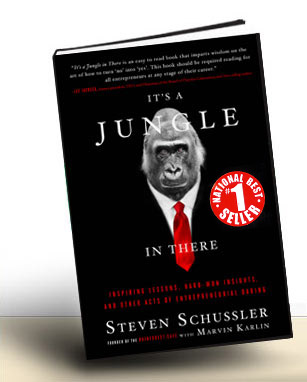
If you want to raise capital for your business, telling an investor that your new venture is weird, expensive to build, and that you’re not sure the health department will go for it is not the best approach. And yet that’s exactly how Steven Schussler, CEO of Schussler Creative, Inc. managed to raise funds for the Rainforest Café, a jungle-themed restaurant chain with 45 locations all over the world.
Schussler appeared at last week’s Perfect Business Summit in Las Vegas to promote his new book, It’s A Jungle In There: Inspiring Lessons, Hard-Won Insights, and Other Acts of Entrepreneurial Daring. In an interview with DocStock founder Jason Azar, Steven Schussler revealed that his biggest step in building his dream was to build a relationship with his investor Lyle Burman, albeit a dysfunctional one.
An entrepreneur with advertising background, Schussler decided to build the Rainforest Café after his 50’s-themed night club chain called JukeBox Saturday Night had run its course. For inspiration, he turned to the tropical birds he kept as pets, intelligent creatures he described as three-year-olds with feathers. Today, Rainforest Cafés are monstrous spaces with indoor waterfalls, singing snakes, and more tropical plants than items on the menu. At California’s Downtown Disney District, the restaurant is tiered like an ancient pyramid and guests have to take an elevator from the gift shop to reach their tables. Inside, animatronic birds poke their heads out of the rocky walls and chirp, punctuated by the occasional grunt from a gorilla. It makes sense at a Disney park, but at the time it was a high-concept idea that would take a lot of capital to develop.
To raise funds Schussler decided to picked a target: Lyle Burman, a professional poker player who had co-founded the Native American gaming company Grand Casinos, Inc. Schussler sent his father to the Las Vegas World Poker Championship where Burman was playing. During a break Schussler’s father sneaked under the red rope and handed Burman a $50 bill with a quick pitch about the restaurant – not a lot of money considering the stakes of the tournament, but the gesture got the player’s attention. Burman handed over his business card and told him to have his son set up an appointment with his assistant. When Schussler followed up, Burman wasn’t exactly thrilled, but he faced a worse alternative: “I told him I’d get my father to bother him again,” said Schussler.
At the time, the entrepreneur was testing out the model in his own home. Schussler was single with no kids, so no one objected when he converted his house into a tropical rainforest, complete with 45 birds, 9 fish tanks, tropical plants and simulated thunderstorms. He painted his walls black to match the darkness of the forest canopy. (At this point, moderator Jason Azar interjected. “You realize that’s why you were single,” he quipped.)
But that was the least of Schussler’s problems. Schussler’s electric bill was through the roof, and while he tried to scrape up enough money to pay it off, the electric company periodically shut off his power. The other investors he brought in to see his terrarium didn’t think a restaurant like that would ever get past the health inspectors. And his personal theme park soon caught the attention of his neighbors, who formed a watch group and pooled their money to buy him a session with a psychiatrist.
This went on for three years. During this time Lyle Burman continued to visit the house, but he wouldn’t write a check – not yet. So Schussler asked him for a job. After building two restaurants for Grand Casinos, Inc., Schussler decided that it was now or never. He walked into Burman’s office with a sign around his neck that read “Lyle made me do it” and threatened to commit suicide if the investor didn’t put up the cash. Burman’s response? “I’m in.”
Once into the project, Schussler went $1 million over budget. Burman sent him home and told him to rent Bugsy, a film in which business men who rode around in limos and bought fur coats for their girlfriends ended up dead in the trunks of their cars. Schussler understood that Burman wanted him to cut down on his spending, but the money was tied up in research and development, not personal luxuries.
When Schussler opened his first location in the Mall of America in Minnesota in October 1994, he had a sales goal of $5 million. Instead, he made $13.5 million, which he said would never have happened without his expensive home laboratory. The company went public in 1995 and by 1996, the stock soared to $50 per share, but unfortunately that didn’t last. Schussler sold the company to Landry Restaurants, Inc. in 2000.
Schussler’s biggest mistake, he said, was failing to have a business plan. All entrepreneurs should have one, if not a prototype or living model of their business. “Make sure your business plan sticks out,” he advised the crowd, because “it needs to speak for you” when you’re not there to promote yourself. Also, if the company takes off, it could become a collector’s item.
To keep the business going, added Schussler,”do what you do well” and “surround yourself with people who are better than you are” at other things. For him, that meant concocting and building models for large-scale, yet scalable themed restaurants and leaving the day-to-day operations to someone else. When he got his next restaurant concept, T-Rex off the ground, he sold 80% of the company to Landry Restaurants. “At the end of the day,” he said, “you don’t have anything but you.”




